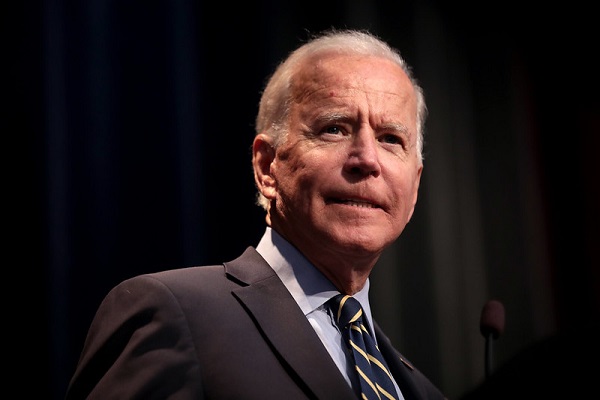
–>
June 11, 2022
Joe Biden went to the port of Los Angeles on Friday, June 10, to make a speech about the economy.
‘); googletag.cmd.push(function () { googletag.display(‘div-gpt-ad-1609268089992-0’); }); }
Nothing odd there. The stock market is down 15% so far this year, inflation is skyrocketing, and energy prices are so high that the unemployed can’t afford the commute if they accept a job. An administration is expected to address these matters.
Unfortunately, in this case, virtually all the problems are caused by the very positions on which this regime is doubling down.
And of all the indelicate, inopportune times and places to choose for this speech, he headed to the busiest, most important seaport in the Americas, twenty days before the deadline crashes down on the most delicate labor negotiation of the year.
‘); googletag.cmd.push(function () { googletag.display(‘div-gpt-ad-1609270365559-0’); }); }
All laborers on the west coast seaports belong to the International Longshore and Warehouse Union (ILWU). While some of them still do the heavy, physical jobs of traditional shipping, the lion’s share of this industry was changed, some seventy years ago, with the advent of containerization and the growth of intermodal transportation.
Instead of the backbreaking work of hand-loading crates, drums, and boxes on and off the deck and hold of a ship, the vast majority of ILWU members are now involved in directing machinery — such as gantry cranes — to swing 20′ and 40′ shipping containers from ship to shore and back again.
ILWU members include clerks, longshoremen, crane operators, and other terminal workers — 15,000 of them — all up and down the west coast, from Bellingham, Washington to San Diego, California.
It’s not easy work, but it’s well compensated; the typical ILWU member earns about $200,000 per year (since that’s an average, there are union members who earn under $100,000 and members who earn over $300,000, depending on specialty, hours, overtime, and seniority). There have long been ILWU members who fly into work on their own private planes.
This is not your typical union.
Their employers are a similarly mixed bag of organizations — the port terminals, the steamship lines, the warehouses and logistics conglomerates that either own their own berths or are contracted by city and state port authorities to operate public berths. Some are massive global concerns; others are smaller niche carriers or local terminal companies. With 29 seaports of various sizes, handling the import and export of everything from bulk materials to automobiles, there is every level of diversity imaginable up and down the coast.
‘); googletag.cmd.push(function () { googletag.display(‘div-gpt-ad-1609268078422-0’); }); } if (publir_show_ads) { document.write(“
And every one of them is on tenterhooks right now, as they count down the days until the expiration of the current labor contract on June 30.
The ILWU, founded 85 years ago and led for some 40 years by the notorious communist labor organizer Harry Bridges, is the sole negotiator for those 15,000 closed-shop employees.
And the Pacific Maritime Association (PMA) faces them on the other side of the table every few years, as they try to lead a motley crew of foreign and domestic companies, from local warehouses to international shipping fleets, into a successful agreement that enables the global economy to keep moving.
In past contract seasons, these negotiations have lasted 3, 6, even 10 months, as “labor” and “management” argued over how much the ports can be expanded and automated to handle the ever-growing container trade. The ILWU has fought such modernization, causing our ports throughput to lag dismally behind the other giant ports on the Pacific, such as Shanghai, Hong Kong, and Singapore.
Ships get larger every year; containers get more numerous every year. The west coast ports have seen an increase of forty to fifty percent (depending on how you count it) in container traffic just these past two years, without substantial expansion in decades.
The ports simply can’t handle the volume. They are too small, too overwhelmed. They desperately need the expansion and automation that the PMA has been calling for, and the ILWU has been rejecting, for decades.
As a result, the entire country is on the brink of recession, with empty store shelves and idled assembly lines, because sea freight transit times have grown from 40 to 50 days up to 120 to 160 or more, all because of the bottlenecks at our ports and railyards.
Negotiations between the PMA and ILWU are delicate at the best of times, and these are not the best of times.
At a time when a firm and uniting hand is desperately needed at the helm of government, calling for the two sides to bargain honorably and diligently for the good of the country, we instead have Joe Biden, who flew to the biggest port in the United States to attack the steamship lines and paint the contract as an us-versus-them battle between good and evil.
He besmirched the PMA as “a consortium of foreign-owned shipping companies… raking in $190 billion in just one year.”
He either doesn’t understand, or doesn’t care, that the steamship lines’ costs have skyrocketed because of government port closures due to the COVID lockdowns, completely out of their control.
He doesn’t understand, or doesn’t care, that when transit times triple or quadruple because of port and rail bottlenecks, these shipping lines now have to pay for their billion-dollar ships with a third or even a quarter as many shipments per container, so their prices simply have to reflect that.
He doesn’t understand, or doesn’t care, that when, just before the pandemic, his global climate hoax comrades at the International Maritime Organization (IMO) forced all the steamship lines to retrofit their ships to process fuel differently — at a cost to the global fleet of $15 billion — they had to pay for that somehow, making them suffer even more than the rest of us as the Biden energy policy has contributed to skyrocketing fuel prices around the world.
The price hikes of the past two years cannot fairly be blamed on the shipping lines … but that doesn’t stop a man who knows nothing about the economy in general, or about the transportation industry in particular.
It hasn’t stopped him from vilifying the steamship lines 20 days before a contract expiration that could easily be the final nail in the coffin of this economy. In a good year, past port strikes have caused painful supply chain delays lasting six months or more. And this year is not a good year.
The man’s sole message should be, “Stay at the table, keep working, absolutely no strike, no stoppage, no slowdown, no matter what … for the good of the country!”
But what is his message? Demonize the steamship lines, and introduce bills in Congress to punish them for everything that’s outside of their control. They’re “foreigners,” after all — the easiest of targets for Democrat politicians for as long as our country has been around.
And what of the inconvenient truths underlying these issues, such as
- The fact that foolish California restrictions on trucking have been among the main drivers of the port bottlenecks?
- The fact that the PMA also includes local city and state port authorities — local communities that depend on the stable operation of these ports?
- The fact that the PMA includes local American terminals and warehousing businesses, too — trucking companies and railroads as well. That the PMA isn’t just the “foreign villains” he paints in the air?
- And what of the fact that his hateful rhetoric could well cause a deeper recession, sooner, and longer-lasting, than it had to be?
He still doesn’t understand.
He still doesn’t care.
And he still doesn’t stop.
John F. Di Leo is a Chicagoland-based international transportation professional. A one-time Milwaukee County Republican Party chairman, he has been writing a regular column for Illinois Review since 2009. His book on vote fraud (The Tales of Little Pavel) and his political satires on the current administration (Evening Soup with Basement Joe, Volumes I and II) are available on Amazon.

Image: Gage Skidmore via Flickr, CC BY-SA 2.0.
<!– if(page_width_onload <= 479) { document.write("
“); googletag.cmd.push(function() { googletag.display(‘div-gpt-ad-1345489840937-4’); }); } –> If you experience technical problems, please write to [email protected]
FOLLOW US ON
<!–
–>
<!– _qoptions={ qacct:”p-9bKF-NgTuSFM6″ }; ![]() –> <!—-> <!– var addthis_share = { email_template: “new_template” } –>
–> <!—-> <!– var addthis_share = { email_template: “new_template” } –>






